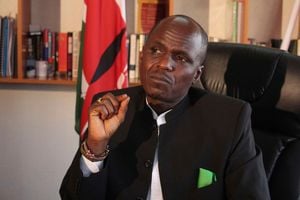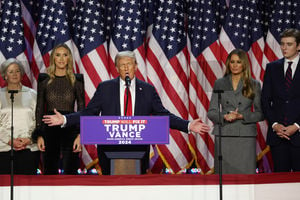
Donald Trump presented himself as the saviour of the American people from an extreme form of liberalism that was threatening the social fabric
By anchoring his campaign message around the economy and family values, Trump was able to strike a fatal blow to Kamala's political jugular. It was as if Americans were waiting for someone to tell them how to navigate their way back to roots.
The November 5 US presidential election was a contest between conservatism and liberalism. Kamala Harris was the face of liberalism. She eloquently articulated why Americans must be allowed unfettered freedom to make rational choices.
At the same time, the former Prosecutor and Attorney-General vouched for Americans to be given control over their bodies, a euphemism for the freedom to terminate a pregnancy at whatever stage if they felt uncomfortable about it. She explained circumstances that warranted abortion as including rape, incest and threat to the mother’s health.
On the other hand, Donald Trump presented himself as the saviour of the American people from an extreme form of liberalism that was threatening the social fabric. Liberalism is a political and moral philosophy based on the rights of individuals, liberty, consent of the governed, political equality, right to private property, equality before the law and individual rights – including civil and human rights – secularism, and freedom of religion.
Liberalism is frequently cited as the dominant ideology of modern history, which has conferred sophistication and advancements in societies that have embraced it. With the rise of the Age of Enlightenment, the word became synonymous with “freedom from narrow prejudice” and “freedom from bigotry”. Liberalism became fashionable as a way of promoting free thought and expression.
Innovation
The benefits of liberalism are not to be ignored. Its promotion of the free market in which factors of production are allocated on the basis of their demand and supply, and respect for private property, has been responsible for enhancement of innovation and entrepreneurial and capability in the United States. Additionally, liberalism has led to recognition and adoption of more civic liberties, freedom of expression and expansion of political space in the Global North. On the contrary, many countries in the Global South that have continued to repress their citizens by denying them universal human rights, including basic civic liberties, are evidently poorer in material terms. There has therefore, been a strong argument that seeks to create a correlation between liberalism as a philosophy and material advancement in society.
It is this reality that has encouraged societies to embrace liberalism as a way of life. Over the years, the Western European and American societies have dangled liberalism as the single most important factor in freeing up the innovative and entrepreneurial streaks that countries need to break out of their material deprivation. In recent decades, development assistance from Europe and America has been couched in liberalism, signifying how keen the West was in trying to spread this philosophy to the rest of the world. While many aspects of liberalism have been critical in freeing up once totalitarian societies, and placing them on progressive trajectories, there are certain practices associated with this philosophy that are inconsistent with non-Western cultures.
Thus, liberalism of the type that has been promoted by Western Europe and America has created tensions within conservative sectors of their own societies and abroad. During the just concluded presidential campaigns, the Democratic flag bearer, Kamala Harris, was the face of extreme liberalism, which sought to empower Americans to make rational decisions regarding individual choices and their relationship with the state. Unbeknownst to Kamala Harris and the Democrats, this kind of thinking has been progressively isolating the US from the rest of the world. United States was created as a Christian country. During the latter part of the 20th Century, however, there emerged a movement to secularize the society. The result is a society that has lost its fundamental beliefs and value systems. There has been a free fall as the society is left to its own designs. Amidst all the excitement about material wealth and expanded freedoms, the American society is definitely experiencing some sort of hollowness that results from a lack of cultural tethering.
Convicted felon on 34 charges
The extreme forms of liberalism, especially as it relates to individual freedoms, is threatening the fabric of the American society, and undermining the moral authority and global standing of the United States. In recent decades, the US has been a target of repeated attacks by mainly Islamic fundamentalist organisations which claim that the global powerhouse is leading the world astray through its flawed value system.
Americans constantly live under the fear of being attacked by foreign countries and organizations that are opposed to the ideas that they are spreading across the globe, including freedom of choice. For Americans, this is a critical issue. They need to be assured of their safety at home and acceptability abroad. Yet, it now emerges that Kamala Harris did not correctly read the mood of Americans as she bombarded them with raw messages of freedom to choose what to do with their bodies, who to relate to, and when and in what circumstances to terminate a pregnancy.
Republican presidential candidate, Donald Trump, quickly responded by twisting Kamala’s message, and creating an impression of her as a person with flawed family values. By anchoring his campaign message around the economy and family values, Trump was able to strike a fatal blow to Kamala's political jugular. It was as if Americans were waiting for someone to tell them how to navigate their way back to roots. Trump’s message was like an idea whose time had come, and it spread like a bushfire in summer, evoking emotions and the resolve among conservative Americans to reclaim the country from the stranglehold of extreme liberalism that was leading them farther away from who they are.
This yearning for a message of hope was evident after the first Trump/Kamala presidential debate which, although the Republican candidate decisively lost, did not significantly improve Kamala's popularity. Pundits immediately embarked on the search for an explanation of this strange phenomenon where a candidate performs extremely poorly in a Presidential Debate but his popularity remains unchanged. The situation was confounded by the additional dubious distinction of Donald Trump being a convicted felon on 34 charges.
Criminal conviction
The world had expected that a combination of a recent criminal conviction, irritating demeanour and poor performance in the Presidential Debate would definitely barter Donald Trump's popularity and undermine his chances of clinching the presidency. Alas, the entire world was wrong. The devil was hidden in the detail. Trump had struck the right chord with the American people. American society was tired of carrying the burden of wayward secularism and was silently yearning for a return to its fundamental belief system. Trump appeared to understand this yearning and effectively coined his message around it.
This situation leaves the rest of the world, especially Africa, that typically gobbles up any exotic ideas without critical analysis, in an extremely awkward position. The US appears to be saying that it has been led astray by an extreme form of liberalism, but it has realised its fundamental flaws, and wants to retrace its steps. Where does this leave countries that had enthusiastically taken up the message of extreme liberalism, and spread it to unsuspecting citizens as the only panacea to societal transformation?
In electing Donald Trump, an unapologetic conservative, the American society is telling the world that it has realised its mistakes, and is now keen to correct them by going back to the fundamental principles on which the United States of America was built. The key lesson for Africa is that it must always jealously guard itself from being used as a guinea pig for social experiments that do not stand to benefit it. Every society must define its development trajectory by embracing values that support its objective interests. Will Trump manage to re-orient the American society back to its fundamental founding principles?
Professor Ongore teaches at the Technical University of Kenya; [email protected]












